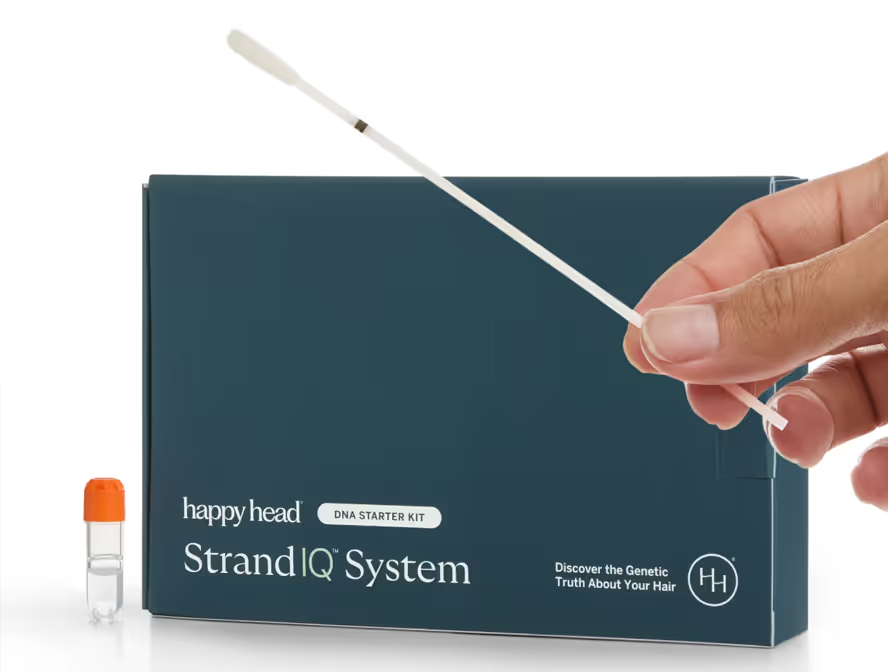Using jojoba oil for hair isn’t a trend—it’s a time-tested method rooted in both science and simplicity.
Extracted from the seeds of the Simmondsia chinensis plant, this golden oil closely mimics the natural sebum your scalp produces, making it exceptionally well-suited for maintaining balance, moisture, and strength.
Whether you’re dealing with dryness, breakage, or scalp irritation, jojoba oil offers a versatile, no-fuss solution backed by a rich profile of vitamins and fatty acids.
In this guide, we’ll explore exactly how it works, what it can (and can’t) do, and how to use it effectively for healthier, more resilient hair.
What Is Jojoba Oil?
Jojoba oil is a golden-colored, odorless liquid wax extracted from the seeds of the Simmondsia chinensis plant, a shrub native to the arid regions of the southwestern United States and northern Mexico.
Technically a wax ester rather than a true oil, its molecular structure closely resembles human sebum, making it highly compatible with the skin and scalp.
Jojoba oil has a lightweight, non-greasy texture that absorbs easily. It's mechanically pressed from the seeds and often cold-pressed to preserve its natural nutrients.
Is Jojoba Oil Good for Hair?
Yes, jojoba oil is considered excellent for hair due to its unique chemical composition and compatibility with the scalp's natural oils. Unlike heavier oils, it closely mimics sebum, the waxy substance produced by sebaceous glands, allowing it to moisturize without clogging follicles.
Its lightweight, non-comedogenic nature makes it suitable for nearly all hair types, including oily or acne-prone scalps. Additionally, it has a stable shelf life, resists oxidation, and serves as a gentle carrier for other nourishing ingredients.
Key Nutrients in Jojoba Oil for Hair
Jojoba oil contains a wide range of nutrients that support overall hair and scalp health. These include:
- Vitamin E: A powerful antioxidant that protects the scalp from oxidative stress and helps strengthen hair follicles.
- B-complex vitamins: Support cellular metabolism and may aid in repairing damaged strands.
- Zinc: Necessary for tissue growth and repair, which is important for healthy follicle function.
- Copper: May contribute to melanin production, which supports natural hair color.
- Fatty acids (omega-9, oleic, and eicosenoic acids): Help moisturize, reduce frizz, and improve elasticity.
- Silicon: Supports collagen production, which can contribute to stronger hair structure.
- Iodine: Offers mild antimicrobial effects that help maintain scalp balance.
Does Jojoba Oil Help With Hair Growth?
While jojoba oil does not directly stimulate new hair growth, it creates a healthier scalp environment that can support optimal hair growth conditions. For those with thinning hair due to dryness or irritation, jojoba oil may offer indirect support.
By moisturizing the scalp, reducing inflammation, and clearing blocked follicles, it may help reduce hair shedding and promote stronger, more resilient strands.
Additionally, its antimicrobial properties help prevent scalp issues such as dandruff or folliculitis, which can interfere with the hair growth cycle.
Jojoba Oil Benefits for Hair
Jojoba oil benefits for hair go beyond simple moisture. Its unique structure and nutrient profile make it especially effective at nurturing both the scalp and strands.
From soothing irritation to shielding hair from damage, here’s a closer look at why this botanical oil has become a favorite among those wishing to improve the health of their scalp and hair.
Rich in Vitamins and Minerals
Jojoba oil contains essential nutrients such as vitamin E, B-complex vitamins, zinc, copper, and silicon. These elements help strengthen hair strands, nourish follicles, and protect the scalp from oxidative stress.
By feeding the scalp with these micronutrients, jojoba oil supports a healthier hair growth cycle and improves the hair’s overall resilience to environmental and chemical stressors.
Moisturizing Properties
As a humectant and emollient, jojoba oil locks in moisture while softening the hair shaft. Its ability to mimic natural sebum allows it to hydrate without leaving hair greasy. This makes it ideal for reducing frizz, smoothing flyaways, and adding natural shine.
Dry, brittle hair often becomes more supple and manageable with regular application, and those with dry scalps can benefit from the added moisture provided.

Protects Against Breakage and Split Ends
Jojoba oil helps reinforce the hair cuticle, reducing the risk of breakage and split ends caused by dryness or mechanical damage.
It improves elasticity and reduces friction during brushing or styling by sealing moisture into the hair shaft. Over time, this protection helps maintain longer, healthier-looking hair with fewer trims needed.
Repairs and Protects
Heat styling, chemical treatments, and daily grooming can leave hair dry and damaged. Jojoba oil forms a protective barrier over the hair shaft, helping to prevent moisture loss during blow-drying or flat-ironing.
Its antioxidant content also helps neutralize free radicals generated by UV exposure or heated tools, reducing long-term damage and brittleness.
Antimicrobial and Antifungal Properties
Jojoba oil has natural antimicrobial and antifungal effects, thanks in part to its iodine content. These properties make it effective against common scalp issues such as folliculitis and seborrheic dermatitis.
By keeping the scalp clean and balanced, jojoba oil may help reduce flaking, itching, and irritation often caused by microbial overgrowth.
Helps Control Dandruff
Dryness and scalp inflammation are key contributors to dandruff. Jojoba oil’s moisturizing and anti-inflammatory properties help soothe irritated skin and reduce flaking. Its antimicrobial action also addresses yeast overgrowth, a common trigger for dandruff.
Regulates Oil Production and Restores pH
Jojoba oil closely resembles human sebum, which allows it to signal the scalp to reduce excess oil production. This can help balance overly oily or dry scalps without disrupting the natural barrier.
Its mildly acidic pH also supports the scalp’s acid mantle, promoting a healthy microbiome and optimal hair and scalp conditions.
Can Reduce Inflammation
Chronic scalp inflammation can interfere with hair growth, cause discomfort, and even lead to hair loss. Jojoba oil contains anti-inflammatory compounds such as vitamin E and omega-9 fatty acids, which help calm redness, itching, and irritation.
Whether the inflammation is caused by dermatitis, allergic reactions, or over-styling, jojoba oil soothes the skin and aids in restoring barrier function.
Helps Control Scalp Psoriasis
While not a cure, jojoba oil can provide relief from scalp psoriasis symptoms by softening plaques and reducing scaling. Its emollient and anti-inflammatory effects make it useful for hydrating dry patches and calming itching.
It also helps remove excess buildup more gently, minimizing trauma to already-sensitive skin during cleansing or exfoliation.
May Slow the Graying Process
Although jojoba oil doesn’t reverse gray hair, its antioxidant content may help protect pigment-producing cells (melanocytes) from oxidative damage, leading to healthier aging of the hair.
Nutrients such as copper and vitamin E may support melanin synthesis and cellular health, thus slowing premature graying.
How To Use Jojoba Oil for Hair
Jojoba oil is incredibly versatile and easy to incorporate into any hair care routine. Whether you're targeting scalp concerns, dryness, or breakage, it can be used in multiple ways to nourish and protect.
1. Apply Jojoba Oil Directly to the Scalp and Hair
Massage a few drops of jojoba oil directly into the scalp to moisturize, reduce flaking, and soothe irritation. Work it through the strands to condition dry ends.
For deeper hydration, use it as a hot oil treatment by warming the oil slightly and leaving it on for 20–30 minutes before rinsing.
2. Mix Jojoba Oil With Other Oils
Jojoba oil pairs well with other nourishing oils such as coconut, argan, castor, or rosemary oil. Mixing it enhances the benefits of each ingredient and allows you to tailor treatments to your specific needs.
It also acts as a stable carrier oil for essential oils used in scalp massage or targeted treatments.
3. Purchase Products Containing Jojoba Oil
Look for shampoos, conditioners, and serums that list jojoba oil as a key ingredient. These products offer the benefits of jojoba oil without requiring a separate step in your routine.
Choose formulations free of sulfates and harsh chemicals to maximize the hydrating, soothing, and protective properties of jojoba oil.
4. As a Beard Treatment
Jojoba oil is also effective for beard care. Apply a few drops to clean, dry facial hair to soften coarse strands, reduce breakage, and hydrate the skin underneath.
Its lightweight texture shouldn’t clog pores, making it ideal for soothing beard itch and preventing flakiness or ingrown hairs.
How Often To Use Jojoba Oil for Best Results
Use jojoba oil 2–3 times per week for general scalp and hair maintenance. Those with dry or curly hair may benefit from more frequent use, while people with oily scalps may need fewer treatments.
As a hot oil or intensive treatment, weekly application is typically sufficient for noticeable improvements in texture and moisture.
Using Jojoba Oil for Hair Health: Results To Expect
With regular use, most people begin to notice improvements in hair texture, moisture retention, and scalp comfort within 2 to 4 weeks. Hair may appear shinier, softer, and less prone to breakage. Flakiness and irritation typically subside with consistent application.

Long-term use supports stronger, more manageable hair and a healthier scalp environment, especially when paired with a gentle, sulfate-free hair care routine.
Using Jojoba Oil for Hair Growth
Using jojoba oil for hair growth without any supporting treatments is not likely to produce your desired results.
Jojoba oil does not stimulate new hair follicles, but it does help reduce scalp inflammation, unblock follicles, and strengthen existing hair. These effects may support healthier growth over time.
Users with dryness-related shedding may see reduced hair loss and stronger regrowth after 6 to 8 weeks of consistent use.
Happy Head offers prescription solutions containing minoxidil, finasteride, spironolactone, and other proven treatments, all customized to address your specific concerns.
Possible Side Effects
Jojoba oil is generally well-tolerated, but allergic reactions are possible. Symptoms may include redness, itching, or a rash on the scalp or skin. Choose cold-pressed, organic jojoba oil to minimize contamination risk.
Always perform a patch test before full application. Avoid applying to broken skin, and discontinue use if irritation occurs.
Tips for Choosing the Best Jojoba Oil for Hair
To get the most benefits from jojoba oil for hair, it's important to choose a high-quality product free from additives and processing residues. Poor-quality oils may contain contaminants or lack the nutrients that make jojoba effective for hair and scalp health.
Look for the following when selecting a product:
- 100% Pure and Organic: Avoid blends or diluted formulas.
- Cold-Pressed: Preserves vitamins and antioxidants.
- Unrefined (Golden Color): Retains natural nutrients and is less processed.
- Stored in Dark Glass Bottles: Protects oil from light-related degradation.
- Reputable Brand: Choose companies with transparent sourcing and third-party testing.
Jojoba Oil for Hair: Is It Right for You?
Jojoba oil is a gentle, nutrient-rich option that suits a wide range of hair types and scalp conditions. If you struggle with dryness, breakage, dandruff, or irritation, it may offer soothing, protective benefits without weighing your hair down or clogging pores.
While it’s not a miracle cure for hair loss, its ability to support scalp health and strengthen strands makes it a valuable addition to many routines. If you're seeking a natural, low-risk way to improve overall hair and scalp wellness, trying jojoba oil for hair may be a smart choice.
Talk to a board-certified dermatologist to discuss your goals and find the solution that is best for you.
Frequently Asked Questions
What happens if I leave jojoba oil in my hair?
Leaving jojoba oil in your hair can deeply moisturize strands, reduce frizz, and protect against breakage. It won't clog pores or leave a greasy residue since it mimics natural sebum. Many use it as an overnight treatment for enhanced softness and shine before washing it out.
How often should I put jojoba oil in my hair?
For most people, applying jojoba oil 2–3 times per week is enough to maintain moisture, support scalp health, and reduce breakage. If your hair is dry, curly, or chemically treated, you may benefit from more frequent use. Oily scalps may need less frequent treatments.
Do you put jojoba oil on wet or dry hair?
Jojoba oil can be applied to both wet and dry hair. On damp hair, it helps seal in moisture after washing. On dry hair, it tames frizz, adds shine, and protects from environmental stress. For scalp treatments, apply it directly to a dry or slightly damp scalp.
Which is better, coconut oil or jojoba oil for hair?
Coconut oil penetrates the hair shaft and reduces protein loss, making it ideal for deep conditioning. Jojoba oil mimics scalp sebum, making it better for moisturizing, balancing oil, and soothing the scalp. The best choice depends on your specific hair needs.












